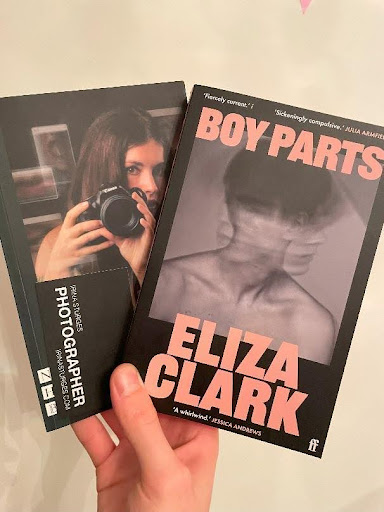
By Daniel Pepin
Do you like contemporary fiction? The kind of fiction that makes you squirm? Boundary pushing, unsettling, compulsive, a little bit sexy? Then chances are you have read or at least heard of Boy Parts by Eliza Clark – if you have not then please do so, for the above reasons. Clark’s debut novel was an instant cult classic, epitomising the manic and obsessive world of the internet era – criticising and dissecting modern gender conflict, classism, and performative art. The razor blade sharp book follows Irina, a Northern fetish photographer as she humiliates and captures explicit photos of young men and boys while surviving off a heady mix of coke, ket, Tesco bag salad, and La Mer. The playbook opens with ‘this is the story as Irina tells it. She is an artist, a monster, a liar. She should not be trusted.’
This seminal novel was a decisive factor in Clark being awarded the coveted position of one of Granta’s Best of Young British Novelists in 2023. Released in 2020 Boy Parts has since gained a loyal, dare I say obsessive, following on social media platforms such as Instagram’s Bookstagram or TikTok’s BookTok – communities with a penchant for unreliable narrators. Being this hot commodity, an adaptation was inevitable. Helmed by Gillian Greer, the Literary Manager of Soho Theatre, who has been recognised for her stellar work with a nomination for the Irish Times Theatre Award in 2015 and winning the Celtic Media Festival Award for best radio drama in 2020.
I will be honest and admit that I was sceptical of Clark’s novel being adapted as a one woman play. The photographed men are so crucial to Irina’s story, I thought, and her relationship with her irritatingly perky, buzzword-abusing friend Flo makes much of the novel’s conflict. Cautious yet optimistic, last Saturday night I took my seat in a centre row of the dank, edgy main stage in Soho Theatre (my mum in tow – perhaps a bold decision) and was promptly handed a fake business card with Irina’s fictional details embossed alongside a QR code that, when activated, sent me to a linktree about the play, and waited.
Perfection.
I can and will say more about this seminal play and its performance, staging, and effects but if you are of an easily distracted disposition then perfection is the best way to explain the brilliance of Greer’s adaptation. The absolute standout was Aimée Kelly’s performance as Irina. Many of you will know Kelly from the Bafta winning BBC YA fantasy series Wolfblood as main character Maddie. She captivated me at 10 years old and again a decade later. Kelly deftly dances between Irina’s unhinged narcissism, Flo’s high-pitched overbearing, and the multitude of mundane men Irina ridicules and fends off. My fears that these men would fade into the background if not actually onstage were completely unfounded. Not only did Kelly create personalities before my eyes but also in reducing the men into stage ephemera Greer accentuates Irina’s frustration in not being taken seriously no matter what she says or does. In her own words: ‘do I have to smash a glass over the head of every single man I come into contact with, just so I leave a mark?’ Making the male figures faceless facets of Irina’s psyche rather than physical beings in order to spotlight the overwhelming patriarchy is a glowing example of translation from page to stage.
Speaking of staging, Kelly’s acting was not the only standout. Sara Joyce, Hayley Egan, Peter Butler, and Christopher Nairne constructed a suitably cold, apathetic, and violently stark stage that matched the superficial simplicity and hidden complexity of both Clark’s novel and Kelly’s performance. Pitch black when not lit. Irradiated with saturated neon’s and whites so bright you had to squint when they shone. Kelly solitary with only a barstool for company and a screen behind her which relayed emails reading backwards as if we were Irina’s laptop while Kelly monologued the contents. Every so often a psychedelic image would caustically flash on the backdrop to drive a particularly striking line home. A blistering runtime, scathing social commentary, and mesmerising performance makes Boy Parts feel like taking a cocktail of Class A’s in a contemporary lit seminar. Every minute unforgettable, every second unmissable.
